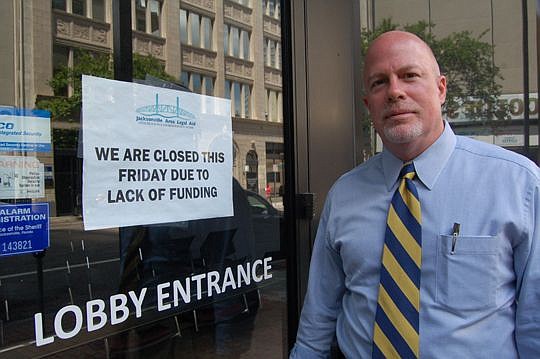
Don’t expect to find Jim Kowalski in his office at Jacksonville Area Legal Aid the first week of October.
He’ll be back at his alma mater to accept the 2015 Peter E. Haas Public Service Award from the University of California, Berkeley.
The medal is given each year to recognize an alumnus who has made a “significant voluntary public contribution to the betterment of society, particularly at the community level.”
Kowalski, who graduated from UC Berkeley in 1986 and then from the University of San Francisco School of Law, will be honored for his pro bono service to victims of mortgage fraud and predatory lending and collection practices.
The former 4th Judicial Circuit assistant state attorney and private practice litigator has served as executive director of Jacksonville’s legal aid effort since December 2012.
Even before he joined JALA, his pro bono work was recognized with the organization’s Pro Bono Award in 2006 and 2008. He received the St. Johns County Legal Aid Pro Bono Award four consecutive years (2009-12) and The Florida Bar President’s Pro Bono Service Award in 2009 and 2011.
He’s a charter member of the Florida Commission on Access to Civil Justice, which is working to develop ways to make legal representation available to everyone in the state who needs it.
“The goal is to help the population,” said Kowalski. “Legal aid is part of the delivery of justice.”
He said a major challenge facing legal aid in general and JALA in particular is while the number of people who need pro bono legal services remains steady, funding for the service has been diminishing for years.
In Jacksonville, 48 percent of the population may be classified as “working poor” in terms of income and 45 percent is being actively pursued by a debt collector.
“That’s every other one of us,” Kowalski said.
On the available resources side of the issue, state funds are not allocated for legal aid and the city has stopped supporting free legal services for the at-risk population.
The Florida Bar Foundation has for years used the interest earned on attorneys’ trust accounts to support legal aid organizations, but the decline in interest rates that began with the Great Recession has reduced the yield available for legal aid from $44 million in 2008 to just $5.3 million last year.
That’s led the local legal community to become creative and look for other ways to fill the need.
The first focus is on family law cases, which along with immigration issues, are the two greatest unmet needs for JALA.
He said the circuit’s Pro Bono Committee is trying to develop a “low bono” or sliding scale for family law.
“It’s a massive population that is not getting assistance,” Kowalksi said.
A fundraising campaign has begun to fund the salary for a legal aid attorney to coordinate clients and attorneys who will represent them for a reduced fee. Kowalski predicts the arrangement will appeal to attorneys who are just beginning their practice.
The Family Law Inns of Court has agreed to provide lawyers to mentor the new attorneys.
Kowalski admits you’ll probably never see a legal aid attorney’s face on the side of a city bus, but that doesn’t mean the work they do isn’t important.
He cites the Pledge of Allegiance when talking about how equal access to fairness within the justice system is basic right for people in America.
“The last four words of the Pledge of Allegiance are ‘and justice for all.’ That doesn’t mean justice only for those who can afford it,” he said.
@drmaxdowntown
(904) 356-2466